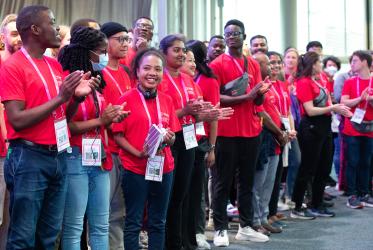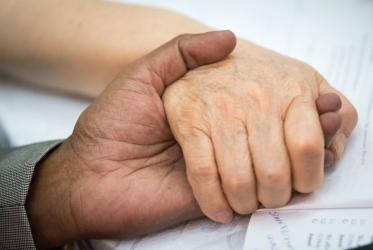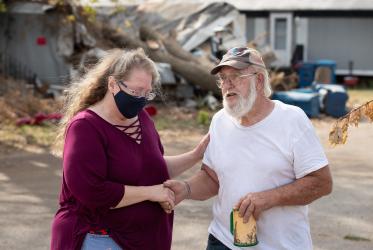The 11th Assembly of the World Council of Churches (WCC) in Karlsruhe (31 August-8 September 2022) met following almost three years of the ongoing global Covid-19 pandemic, which may be responsible - directly and indirectly - for a death toll of 15 million or more (based on excess mortality data), as well as widespread social, economic and political disruption and destabilization. This terrible experience awakens us all to the real and continuing threat of pandemics in our hyper-connected and over-exploited world.
Other longstanding challenges to health and wellbeing have been masked - or in some cases exacerbated - by the pandemic. In 2019, the 10 leading causes of death globally were ischaemic heart disease, stroke, chronic obstructive lung disease, lower respiratory infections, neonatal diseases, cancers of lungs and airways, Alzheimer’s disease and other dementias, diarrhoeal diseases, diabetes mellitus and kidney diseases. (https://www.who.int/news-room/fact-sheets/detail/the-top-10-causes-of-death).
While communicable diseases have declined, noncommunicable diseases (NCDs) have increased over the years in almost all countries. NCDs cause 41 million deaths each year, equivalent to 71% of all deaths globally, and 77% of all NCD deaths are in low- and middle-income countries.
Almost 1 in 3 child deaths globally are caused by pneumonia and diarrhoea - diseases which are preventable and treatable. And other diseases such as Polio, long thought to have been close to elimination, are once again on the rise.
Moreover, concomitant with the Covid-19 pandemic, this period has also seen a pandemic of mental health issues, especially for children and young people whose lives and development have been especially severely disrupted. This has been compounded by physical abuse and sexual and gender based violence, in addition to the disruption in access to education, resulting from lockdowns and enforced isolation at home.
The pandemic also resulted in exceptional pressures on the physical and mental health of overburdened and under-supported frontline medical and health workers, many of whom suffered burnout and other health consequences while seeking to care for so many others.
The Covid-19 pandemic has highlighted several obstacles that have been hampering the full realization of the vision of health and wellbeing for all (Sustainable Development Goal 3). These obstacles include issues specific to the medical field, but also issues pertaining to how the health sector relates with economic, cultural, religious and other sectors. Given some churches’ initial response to the introduction of vaccines, and the subsequent shift when dialogue was initiated by healthcare professionals on the frontline, it is clear that there is need for greater interaction between the sectors.
The pandemic has on the other hand underlined the importance and indeed the necessity of health remaining high on the agenda of the churches. Many churches contributed actively in providing correct health education, undertaking local and international advocacy for equitable supply of Covid-19 vaccines and other health goods and services, by opening up church premises to be used for Covid-19 services, and offering diaconal services to mitigate the socio-economic impact. Almost all the major causes of mortality and morbidity can be reduced significantly by church-based health promotion programmes.
Since the WHO’s 1978 declaration of the “Health for all by the year 2000” agenda, human longevity has increased, while infant and child mortality have decreased significantly. For example, child mortality has decreased from 124 per 1000 children in 1978 to 43 per 1000. These gains are, however, modest in comparison to the targets set. Further, there are increased inequalities where scarce health resources can be purchased by a wealthy minority, while the majority of poor people are denied access to even basic health care services.
In addition, since 1978 the population has almost doubled and is still growing, making it more difficult for health, food and social services (like education, water, sanitation and hygiene) to be assured, leading to worsening poverty, environmental degradation and other socio-economic determinants of health. Population growth is outstripping socio-economic development in most countries. Increasing expenditure on military and armaments by many countries continues to reduce public investment in health and other related social sectors dramatically.
Neglected tropical diseases are sometimes called diseases of the poor, and still serve as an example of persisting lack of equity and justice in health.
Sexual and reproductive health and related rights is often seen as a contentious area for many churches, for cultural reasons or based on concerns regarding ‘hidden agendas’ contrary to biblical teachings. However, avoiding addressing these issues results in women and girls facing grave consequences such as obstetric fistula, female circumcision, unplanned pregnancies resulting from rape and incest, botched abortions (in places where abortion is illegal), foeticide and infanticide. Moreover, girls and women in many poorer countries and rural areas continue to lack access to education on puberty and to sanitary supplies for menstruation, affecting their dignity and development.
In many countries medical services and primary health care facilities are directly affiliated with religious groups. Addressing issues related to reproductive health is of special concern to practitioners in places of displacement and conflict. Moreover, addressing the long-term trauma and discrimination suffered by both the victims of sexual and gender-based violence (SGBV) as well as the children born to them in such circumstances is a paramount concern for churches.
Jointly with other partners, the WCC has recently taken up the issue of obstetric fistula as a human rights concern. The WHO estimates that each year between 50,000 and 100,000 women worldwide are affected by this condition, which is an injury often resulting from giving birth without adequate health care, from sexual violence, or in connection with female genital mutilation (FGM). An estimated 2-3 million women live with untreated obstetric fistula, mainly in Asia and Africa. Obstetric fistula is entirely preventable and treatable, and has been eliminated in developed countries. But in some parts of the world it is one of the major causes of maternal mortality and morbidity. Women who experience obstetric fistula suffer constant incontinence and other health problems. Due to the shame and social segregation which results from this condition, it is largely a hidden concern. Churches have a critical role to play in supporting women in their communities who are suffering in this way, in raising awareness about the concern and confronting the discrimination and stigma attached to the issue, and advocating for the prevention of the condition through adequate health care, for access to repair surgery for affected women, and for all affected by this condition to be treated with dignity and respect.
With regard to the ongoing struggle against HIV and AIDS, a human rights approach has helped to improve prevention, treatment and support services However, the recent report “In Danger: UNAIDS Global AIDS Update 2022” details how social, economic inequalities, within and between countries, are stalling progress in the HIV response, and how HIV is making those inequalities acute. In 2021, an adolescent girl or young woman was newly infected with HIV every two minutes. The Covid-19 pandemic caused HIV treatment disruptions in many countries as governments focused on the response to the pandemic. Moreover, the marked increase in child and teenage pregnancies, cases of female circumcision, and cyberporn of minors documented in several countries during the first few months of the pandemic lockdown, attest to the negative side-effects of the lockdown measures prior to the introduction of Covid-19 vaccines.
In 2021, one person with HIV died every minute, accounting for 650,000 AIDS-related deaths despite the availability of effective HIV treatment and tools to prevent, detect and treat opportunistic infections. Currently 10 million people living with HIV do not have access to treatment. Only half (52%) of children living with HIV have access to life-saving medicine, and the inequality in HIV treatment coverage between children and adults is increasing.
The world is not moving fast enough to end the inequalities that drive pandemics. Neither is the church, and that is a lost opportunity since the church has such extensive networks among people that live in the midst of those inequalities.
Although more remains to be done to finally defeat HIV as a public health threat, the gains so far should serve as an encouragement to scale up comprehensive approaches to fighting diseases, leaving no one behind. Ecumenical efforts on HIV and AIDS must be more sustainable, integral, holistic and comprehensive.
Mental health is a vital aspect of well-being throughout a person’s life—it is the ability to be self-aware, manage one’s emotions, and cope with problems. Childhood and adolescence have been found to be the most crucial stages for developing mental health resilience. Presently, it is estimated that around 10-20% of adolescents worldwide suffer from mental health conditions that are untreated and undiagnosed (WHO, 2019).
Mental health issues are increasing among adolescents, and mental disorders are the leading cause of disability among the youth (Cassels, 2011). According to WHO (2019) common problems found among adolescents are: emotional disorders, childhood behavioural disorders, eating disorders, psychosis, suicide and self-harm, and risk-taking behaviours. The American Psychology Association and WHO strongly suggest mental health promotion and intervention, as well as addressing mental health problems early in order to prevent serious complications in the future.
In the context of accelerating climate crisis, more and more children and youth experience ‘eco-anxiety’, which the American Psychological Association describes as "a chronic fear of environmental doom." Close to 60% of the young people who responded to a recent global online survey of 10,000 teenagers and young adults in 10 countries said that they felt "very" or "extremely" worried about climate change while 75% said that "the future is frightening", 56% believe that "humanity is doomed" and 39% were hesitant to have children. 58% of respondents felt that governments were betraying them and future generations.
Indeed, the climate crisis and other environmental factors are key drivers of almost all major causes of mortality and morbidity, and many global health experts consider climate change to be the greatest threat to human health. Furthermore, social isolation and loneliness is an important determinant of negative outcomes with regard to many aspects of mental and physical health.
All these health challenges are compounded by economic disparities and inequitable access to health care. Far too many communities, especially in poorer countries and regions, still lack access to basic health education and health care, though health is recognized as a fundamental human right. Among other things, vaccine inequity remains a major obstacle to effective public health measures in many poorer countries and communities.
In February 2022, in light of these many challenges as well as of the historic and current role of churches as health care providers, the WCC central committee re-established an ecumenical commission on health, the Commission of the Churches on Health and Healing (CCHH). This will be the ecumenical movement’s main vehicle for galvanising the churches’ collective efforts to promote ministries of health and healing, and to help ensure that churches fulfil their calling to be leading actors for health and wellbeing for all.
In this effort we keep stressing the healing power of our faith and the hope that connects us to life itself in Christ and makes us partake of eternity.
Following the exchange of experiences and lessons learned that took place at the 11th Assembly, the WCC executive committee, meeting on 7-12 November 2022 in Bossey, Switzerland:
Welcomes the establishment of a WCC ecumenical commission on health and healing;
Invites WCC member churches to:
- Commit to becoming ‘health-promoting churches’ by running evidence-based health promotion ministries;
- Evaluate their national health systems and identify critical areas where they can intervene in order to ensure comprehensive and inclusive health services;
- Assess their current portfolios of health-related programmes against community needs and gaps in available health services, and redesign their health ministries accordingly, especially to meet the needs of women and girls, people living with HIV, people with disabilities, those facing mental health challenges, and other under-served groups and socially-isolated people;
- Engage with their governments with regard to vaccine inequity and to promote resources for local production of vaccines and other needed health products;
- Take measures to address the trauma, stigma and discrimination faced particularly by women and girls due to SGBV, and ensure their meaningful participation and inclusion in programmes that provide redress and rehabilitation;
- Establish health-promotion ministries in all congregations, as a means of revitalising the ecumenical commitment to primary health care for all;
Encourages all theological education institutions to integrate public health issues in their educational and training curricula.





